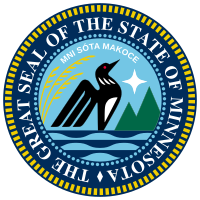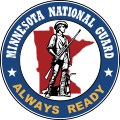Seal of Minnesota: Difference between revisions
m Reverted 1 edit by 64.8.141.161 identified as test/vandalism using STiki |
Cyberbot II (talk | contribs) Rescuing 3 sources. #IABot |
||
| Line 16: | Line 16: | ||
|image3_caption = |
|image3_caption = |
||
|armiger = State of Minnesota |
|armiger = State of Minnesota |
||
|year_adopted = May 10, 1983<ref>{{cite web|title=1.135 STATE SEAL|work=Laws of Minnesota|chapter=119|number=808|url= |
|year_adopted = May 10, 1983<ref>{{cite web|title=1.135 STATE SEAL |work=Laws of Minnesota |chapter=119 |number=808 |url=https://www.revisor.mn.gov/laws/?doctype=Chapter&year=1983&type=0&id=119 |publisher=State of Minnesota |author=Office of the Revisor of Statutes |date=May 10, 1983 |accessdate=March 12, 2014 |deadurl=yes |archiveurl=https://web.archive.org/web/20140312050253/https://www.revisor.mn.gov/laws/?doctype=Chapter&year=1983&type=0&id=119 |archivedate=March 12, 2014 }}</ref> |
||
|crest = |
|crest = |
||
| Line 30: | Line 30: | ||
}} |
}} |
||
The '''Great Seal of the [[State of Minnesota]]''' is the [[seals of the U.S. states|state seal]] of the [[U.S. state]] of [[Minnesota]]. Originally adopted in 1858, it has undergone several alterations since then, in 1971 and 1983.<ref>{{cite web|url= |
The '''Great Seal of the [[State of Minnesota]]''' is the [[seals of the U.S. states|state seal]] of the [[U.S. state]] of [[Minnesota]]. Originally adopted in 1858, it has undergone several alterations since then, in 1971 and 1983.<ref>{{cite web|url=http://www.leg.state.mn.us/webcontent/leg/symbols/sealarticle.pdf |title=State Seal |author=Minnesota Historical Society |publisher=State of Minnesota |pages=21-23 |accessdate=September 5, 2005 |deadurl=yes |archiveurl=https://web.archive.org/web/20050905003524/http://www.leg.state.mn.us/webcontent/leg/symbols/sealarticle.pdf |archivedate=September 5, 2005 }}</ref> |
||
==Symbolism== |
==Symbolism== |
||
The sun, visible on the western horizon, signifies summer in the northern hemisphere. The horizon's visibility signifies the flat plains covering much of Minnesota. The American Indian on horseback is riding towards the south and represents the American Indian heritage of Minnesota. The Indian's horse and spear and the Pioneer's ax, rifle, and plow represent tools that were used for hunting and labor. The stump symbolizes the importance of the lumber industry in Minnesota's history. The [[Mississippi River]] and [[St. Anthony Falls]] are depicted to note the importance of these resources in transportation and industry. The cultivated ground and the plow symbolize the importance of agriculture in Minnesota. Beyond the falls three pine trees represent the state tree and the three pine regions of Minnesota; the St. Croix, Mississippi, and Lake Superior.<ref>{{cite web|title=Minnesota Statutes - 1.135 STATE SEAL|url= |
The sun, visible on the western horizon, signifies summer in the northern hemisphere. The horizon's visibility signifies the flat plains covering much of Minnesota. The American Indian on horseback is riding towards the south and represents the American Indian heritage of Minnesota. The Indian's horse and spear and the Pioneer's ax, rifle, and plow represent tools that were used for hunting and labor. The stump symbolizes the importance of the lumber industry in Minnesota's history. The [[Mississippi River]] and [[St. Anthony Falls]] are depicted to note the importance of these resources in transportation and industry. The cultivated ground and the plow symbolize the importance of agriculture in Minnesota. Beyond the falls three pine trees represent the state tree and the three pine regions of Minnesota; the St. Croix, Mississippi, and Lake Superior.<ref>{{cite web|title=Minnesota Statutes - 1.135 STATE SEAL |url=https://www.revisor.mn.gov/statutes/?id=1.135 |work=Office of the Revisor of Statutes |date=1983 |accessdate=June 9, 2012 |deadurl=yes |archiveurl=https://web.archive.org/web/20120609183928/https://www.revisor.mn.gov/statutes/?id=1.135 |archivedate=June 9, 2012 }}</ref> |
||
In the original version, the Indian is dressed in his war costumes while the farmer is in the field with his firearm. There seems to have been great tension between certain tribes of the Sioux and the settlers. "The Indian's Revenge<ref>{{Cite book|title = The Indians' revenge; or, Days of horror. Some appalling events in the history of the Sioux.|url = http://catalog.hathitrust.org/Record/006510760|publisher = P. J. Thomas|date = 1891-01-01|location = San Francisco|first = Alexander|last = Berghold|first2 = P. J.|last2 = Thomas}}</ref>" by Alexander Berghold, writes about an outbreak of Indian attacks which started much as the scene in the original seal. The author makes the statement that after the attacks, settlers were allowed to kill any Sioux that was found in a settlement and that no settler left their home without their rifle. He goes on to say, "The seal of the State, therefore, seems very appropriate." |
In the original version, the Indian is dressed in his war costumes while the farmer is in the field with his firearm. There seems to have been great tension between certain tribes of the Sioux and the settlers. "The Indian's Revenge<ref>{{Cite book|title = The Indians' revenge; or, Days of horror. Some appalling events in the history of the Sioux.|url = http://catalog.hathitrust.org/Record/006510760|publisher = P. J. Thomas|date = 1891-01-01|location = San Francisco|first = Alexander|last = Berghold|first2 = P. J.|last2 = Thomas}}</ref>" by Alexander Berghold, writes about an outbreak of Indian attacks which started much as the scene in the original seal. The author makes the statement that after the attacks, settlers were allowed to kill any Sioux that was found in a settlement and that no settler left their home without their rifle. He goes on to say, "The seal of the State, therefore, seems very appropriate." |
||
Revision as of 02:39, 1 April 2016
| Great Seal of the State of Minnesota | |
|---|---|
 | |
| Versions | |
 Historical coat of arms (illustrated, 1876) | |
| Armiger | State of Minnesota |
| Adopted | May 10, 1983[1] |
| Motto | L'Étoile du Nord (Template:Lang-en) |
| Earlier version(s) |  |
| Use | Former Minnesotan state seal, used from 1858 to 1971. |
The Great Seal of the State of Minnesota is the state seal of the U.S. state of Minnesota. Originally adopted in 1858, it has undergone several alterations since then, in 1971 and 1983.[2]
Symbolism
The sun, visible on the western horizon, signifies summer in the northern hemisphere. The horizon's visibility signifies the flat plains covering much of Minnesota. The American Indian on horseback is riding towards the south and represents the American Indian heritage of Minnesota. The Indian's horse and spear and the Pioneer's ax, rifle, and plow represent tools that were used for hunting and labor. The stump symbolizes the importance of the lumber industry in Minnesota's history. The Mississippi River and St. Anthony Falls are depicted to note the importance of these resources in transportation and industry. The cultivated ground and the plow symbolize the importance of agriculture in Minnesota. Beyond the falls three pine trees represent the state tree and the three pine regions of Minnesota; the St. Croix, Mississippi, and Lake Superior.[3]
In the original version, the Indian is dressed in his war costumes while the farmer is in the field with his firearm. There seems to have been great tension between certain tribes of the Sioux and the settlers. "The Indian's Revenge[4]" by Alexander Berghold, writes about an outbreak of Indian attacks which started much as the scene in the original seal. The author makes the statement that after the attacks, settlers were allowed to kill any Sioux that was found in a settlement and that no settler left their home without their rifle. He goes on to say, "The seal of the State, therefore, seems very appropriate."
The first seal was adopted in 1858 and the attacks were in 1862.
Government Seals of Minnesota
-
Seal of the Minnesota Department of Transportation
-
Seal of the Minnesota National Guard
See also
References
- ^ Office of the Revisor of Statutes (May 10, 1983). "1.135 STATE SEAL". Laws of Minnesota. State of Minnesota. Archived from the original on March 12, 2014. Retrieved March 12, 2014.
{{cite web}}:|chapter=ignored (help); Unknown parameter|deadurl=ignored (|url-status=suggested) (help) - ^ Minnesota Historical Society. "State Seal" (PDF). State of Minnesota. pp. 21–23. Archived from the original (PDF) on September 5, 2005. Retrieved September 5, 2005.
{{cite web}}: Unknown parameter|deadurl=ignored (|url-status=suggested) (help) - ^ "Minnesota Statutes - 1.135 STATE SEAL". Office of the Revisor of Statutes. 1983. Archived from the original on June 9, 2012. Retrieved June 9, 2012.
{{cite web}}: Unknown parameter|deadurl=ignored (|url-status=suggested) (help) - ^ Berghold, Alexander; Thomas, P. J. (1891-01-01). The Indians' revenge; or, Days of horror. Some appalling events in the history of the Sioux. San Francisco: P. J. Thomas.



